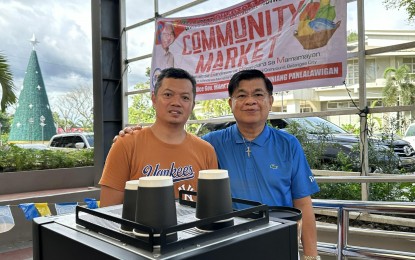
BATANGUEÑO FOOD PRODUCERS. Arnold Malbataan, chairperson of the Samahan ng Magkakape sa Lipa (SML), is seen in this undated photo with Lucito Chavez, president of the Asosasyon ng Panaderong Pilipino, a group symbolically based in Cuenca, Batangas. The SML on Monday (Feb. 5, 2024) urged stakeholders to help keep "kapeng barako" alive. (Photo by Pot Chavez)
LIPA CITY, Batangas – A farmers' group here is urging stakeholders to take part in the preservation and development of "Coffea liberica" through enhanced technical support and aggressive business promotions.
In an interview on Monday, Arnold Malbataan, chairperson of the Samahan ng Magkakape sa Lipa (SML), urged concerned government agencies and the scientific community to help Batangas coffee farmers propagate the variety known locally as “kapeng barako”, which has been proven to be well adapted to the province’s climate and soil conditions.
He said despite ideal conditions in Batangas, the production of Coffea liberica has actually declined in recent years.
Malbataan said the poor productivity is causing this province to miss out on many economic opportunities because Coffea liberica is currently in great demand in the international market.
“Coffee science is very important for the consumer to understand what they are drinking. I suggested to the University of Batangas to have an elective course not only to educate the students but also help promote the coffee industry,” he said.
Malbataan noted that the low agricultural output can be traced to aging farmers and the reluctance of their children to till the land, as well as shrinking farmlands due to urbanization in the province.
He said the younger generation of farmers has been drawn to planting other high-value crops that have quicker turnaround periods, at the expense of coffee production.
“Here in our province, plantations need to be extended and there should be a program for idle lands to be converted into coffee plantations,” Malbataan said.
The SML is asking the Department of Agriculture (DA) to help coffee farmers gain access to higher quality Coffea liberica seeds to ensure higher productivity.
Malbataan added that the local coffee sector will benefit greatly from other government interventions such as promotional activities, to open more doors in the international coffee market.
Meanwhile, he recognized the efforts of the DA, Department of Science and Technology (DOST), and the Department of Trade and Industry (DTI) in developing the industry at the provincial and regional levels.
He expressed optimism that efforts to develop the technical and business capabilities of the province’s coffee farmers will continue to receive government funding through the DA’s Calabarzon arm.
Malbataan believed that the continued support of the national and local government as well as the private sector would pave the way for the growth of the coffee industry.
He said Lipa Mayor Eric Africa has proposed planting 100,000 coffee seedlings in the city this year. The group is looking forward to joining the Philippine Coffee Expo in June to showcase the coffee industry of the province. (PNA)
